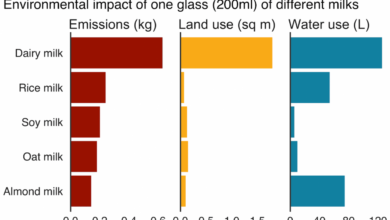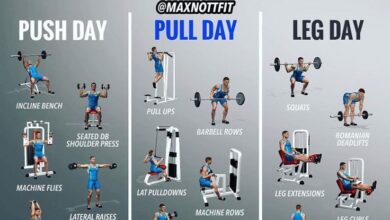
Is Skipping Breakfast Really That Bad for Weight Loss?
Is skipping breakfast really that bad for weight loss? It’s a question that has sparked countless debates and fueled various dietary trends. Some swear by the power of a morning meal to kickstart their metabolism and keep hunger at bay, while others believe that fasting for a few hours can be a more effective strategy for shedding pounds.
Let’s dive into the science behind this age-old dilemma, exploring the potential benefits and drawbacks of breakfast skipping for weight loss.
The truth is, there’s no one-size-fits-all answer. Whether or not skipping breakfast is detrimental to your weight loss journey depends on a multitude of factors, including your individual metabolism, lifestyle, and dietary preferences. This article aims to provide a comprehensive overview of the research and insights surrounding breakfast skipping, empowering you to make informed decisions about your own eating habits.
The Science Behind Breakfast and Weight Loss
The decision to skip breakfast is often driven by personal preference or time constraints. However, understanding the science behind breakfast and its impact on weight loss can provide valuable insights. Let’s delve into the scientific aspects of breakfast and its role in managing weight.
Blood Sugar Regulation and Appetite Control
Breakfast plays a crucial role in regulating blood sugar levels, which in turn affects appetite and calorie intake throughout the day. Consuming a balanced breakfast helps stabilize blood sugar levels, preventing spikes and crashes that can trigger hunger pangs and cravings.
By providing a steady supply of energy, breakfast can help you feel more satiated and less likely to overeat later in the day. Research suggests that individuals who eat breakfast tend to have better blood sugar control and experience reduced cravings, ultimately contributing to healthier dietary choices.
Metabolic Rate and Intermittent Fasting
The relationship between breakfast skipping and metabolic rate is a complex one, often debated. Some studies suggest that skipping breakfast might temporarily boost metabolism, a phenomenon observed in intermittent fasting protocols. Intermittent fasting involves alternating periods of eating and fasting, and some studies have shown that it can lead to weight loss and improved metabolic health.
However, the effects of intermittent fasting are still being studied, and the long-term impact on metabolic rate and overall health requires further research.
Hormonal Responses: Leptin and Ghrelin
Breakfast skipping can influence hormonal responses, particularly those of leptin and ghrelin. Leptin, known as the “satiety hormone,” signals to the brain when you’re full. Ghrelin, on the other hand, is the “hunger hormone,” stimulating appetite. Research indicates that skipping breakfast can lead to increased ghrelin levels and decreased leptin levels, potentially promoting hunger and cravings throughout the day.
This hormonal imbalance could contribute to overeating and weight gain.
Nutritional Considerations

A balanced breakfast offers a plethora of nutritional benefits, particularly in the context of weight loss. Starting your day with a nutritious meal provides your body with the essential nutrients it needs to function optimally throughout the day.
Nutritional Benefits of a Balanced Breakfast
A balanced breakfast is rich in essential nutrients that play a crucial role in maintaining overall health and promoting weight loss.
So, is skipping breakfast really that bad for weight loss? It’s a common question, and the answer isn’t as simple as you might think. It’s often the sugar cravings that make breakfast seem like a struggle. If you’re finding yourself reaching for sugary cereals or pastries, it might be time to tackle the root of the problem – your sugar addiction.
Ask the dietitian how can you beat a sugar addiction to find healthier ways to fuel your morning. Once you’ve got those cravings under control, you can explore different breakfast options that fit your lifestyle and weight loss goals.
- Protein:Protein is essential for building and repairing tissues, regulating blood sugar levels, and promoting satiety. A breakfast rich in protein can help you feel fuller for longer, reducing cravings and preventing overeating throughout the day.
- Fiber:Fiber is an indigestible carbohydrate that aids digestion, promotes satiety, and helps regulate blood sugar levels. A breakfast high in fiber can help you feel full and satisfied, reducing your calorie intake overall.
- Complex Carbohydrates:Complex carbohydrates, such as whole grains, provide sustained energy release, helping you avoid energy crashes and maintain stable blood sugar levels throughout the morning. This can improve your focus and cognitive function, making it easier to make healthy choices throughout the day.
So, is skipping breakfast really that bad for weight loss? While some studies suggest it can be, I find that a hearty, satisfying breakfast like this crockpot kale and sausage farrotto bowl sets me up for a day of healthy eating choices, making it easier to avoid those mid-morning cravings that can derail my weight loss goals.
It’s all about finding what works best for your individual needs and lifestyle, right?
Nutritional Deficiencies from Skipping Breakfast
Skipping breakfast can lead to several nutritional deficiencies, impacting your energy levels, cognitive function, and overall health.
So, is skipping breakfast really that bad for weight loss? While it might seem counterintuitive, it’s not necessarily a weight loss killer. The real culprit might be what we’re replacing breakfast with – like those sugary, processed juices we often reach for.
Check out the sugary truth and the downfall of juice to see what I mean. Focusing on whole, unprocessed foods throughout the day, whether you eat breakfast or not, is ultimately what matters most for healthy weight management.
- Reduced Energy Levels:Breakfast provides your body with the initial energy boost it needs to start the day. Skipping breakfast can lead to low blood sugar levels, causing fatigue, sluggishness, and difficulty concentrating.
- Impaired Cognitive Function:A lack of essential nutrients from breakfast can negatively impact cognitive function, leading to reduced focus, memory problems, and difficulty making sound decisions. Studies have shown that skipping breakfast can impair performance on cognitive tasks, including problem-solving and decision-making.
- Increased Risk of Chronic Diseases:Skipping breakfast can increase your risk of developing chronic diseases such as type 2 diabetes, heart disease, and obesity. A balanced breakfast helps regulate blood sugar levels, reduces cholesterol, and promotes overall metabolic health.
Sample Breakfast Menu for Weight Loss, Is skipping breakfast really that bad for weight loss
Here’s a sample breakfast menu that caters to various dietary preferences and supports weight loss goals:
- Oatmeal with Berries and Nuts:This option provides a good source of fiber, complex carbohydrates, and protein. You can add a scoop of protein powder for an extra boost.
- Greek Yogurt with Fruit and Granola:Greek yogurt is rich in protein and calcium, while fruit provides essential vitamins and antioxidants. Granola adds some healthy fats and fiber.
- Scrambled Eggs with Whole-Wheat Toast and Avocado:This hearty breakfast offers a good balance of protein, healthy fats, and complex carbohydrates. Avocado is a great source of healthy fats and fiber, promoting satiety.
- Smoothie with Protein Powder, Fruits, and Vegetables:Smoothies are a quick and convenient option for breakfast. Adding protein powder, fruits, and vegetables ensures a nutrient-rich and filling meal.
Individual Factors and Lifestyle Choices
While the science suggests that breakfast can be beneficial for weight management, it’s crucial to acknowledge that individual factors and lifestyle choices play a significant role in how breakfast skipping impacts weight loss. Understanding these factors can help individuals make informed decisions about their eating habits.
Age
The relationship between breakfast skipping and weight loss can vary with age. Younger individuals, especially those in their teens and early twenties, may be more sensitive to the metabolic effects of skipping breakfast. This is because their bodies are still developing and require regular fuel to support growth and development.
On the other hand, older adults may find that skipping breakfast doesn’t significantly affect their weight, as their metabolism slows down with age.
Activity Level
Individuals who engage in regular physical activity may benefit more from eating breakfast. This is because exercise increases energy expenditure, and consuming a balanced breakfast can replenish energy stores and support muscle recovery. Conversely, those with sedentary lifestyles may find that skipping breakfast doesn’t have a significant impact on their weight, as their energy needs are lower.
Genetics
Genetic factors can also influence the impact of breakfast skipping on weight loss. Some individuals may be genetically predisposed to be more sensitive to the metabolic effects of skipping breakfast, while others may be less affected. For example, individuals with a genetic predisposition to insulin resistance may find that skipping breakfast exacerbates their condition, leading to weight gain.
Breakfast Timing Strategies
The timing of breakfast can also influence its impact on weight loss. Early morning meals, consumed within an hour of waking up, may be more beneficial for weight management than late morning meals. This is because early morning meals can help regulate blood sugar levels and prevent cravings throughout the day.
However, individuals with different schedules and preferences may find that late morning meals work better for them.
Lifestyle Factors
Lifestyle factors, such as stress, sleep quality, and overall dietary habits, can significantly influence the relationship between breakfast skipping and weight loss.
Stress
Chronic stress can disrupt hormonal balance and increase cortisol levels, which can lead to weight gain. In such situations, skipping breakfast may exacerbate the negative effects of stress by further disrupting hormonal balance.
Sleep Quality
Adequate sleep is crucial for regulating appetite hormones and maintaining a healthy weight. When sleep-deprived, individuals may experience increased hunger and cravings, which can lead to overeating. Skipping breakfast may further exacerbate these issues by prolonging the period of fasting and increasing the risk of overeating later in the day.
Overall Dietary Habits
The impact of breakfast skipping on weight loss is also influenced by overall dietary habits. Individuals who follow a balanced and nutritious diet, rich in fruits, vegetables, and whole grains, may find that skipping breakfast doesn’t significantly affect their weight.
However, those who consume a diet high in processed foods and sugary drinks may find that skipping breakfast leads to increased cravings and overeating later in the day.
The Role of Habits and Behavior
The impact of breakfast skipping on weight management is not solely determined by its nutritional value. Our ingrained eating patterns and habits play a significant role in shaping our relationship with breakfast and its effect on our weight. Understanding the interplay between behavior and breakfast can be crucial for developing sustainable strategies for weight loss.
The Influence of Established Eating Patterns
Our established eating patterns, often formed over years, can significantly influence our breakfast choices. If you’re accustomed to skipping breakfast, it might be difficult to suddenly incorporate it into your routine. This is because our bodies adapt to our habits, and our hunger cues may align with our established eating patterns.
For example, if you’ve always skipped breakfast and feel full until midday, your body might not signal hunger until later, making it harder to eat breakfast. This highlights the importance of gradually adjusting our eating habits to incorporate breakfast without causing significant disruptions.
Psychological Factors Contributing to Breakfast Skipping
Beyond physiological factors, psychological factors also play a significant role in breakfast skipping. Time constraints, lack of appetite, and emotional eating are common reasons why individuals skip breakfast.
- Time constraints: A busy schedule can make it challenging to find time for breakfast. Juggling work, family, and other commitments can lead to prioritizing other tasks over breakfast.
- Lack of appetite: Some individuals may not feel hungry in the morning. This can be due to various factors, including genetics, sleep patterns, and stress levels.
- Emotional eating: Skipping breakfast can sometimes be a coping mechanism for stress or negative emotions. For some, food can be a source of comfort, and they might skip breakfast to avoid indulging in emotional eating later in the day.
Developing a Sustainable Breakfast Routine
Creating a sustainable breakfast routine requires a multifaceted approach that addresses both behavioral and nutritional factors.
- Identify your current breakfast habits: Start by understanding your current breakfast routine. Do you regularly skip breakfast? If so, what are the reasons behind it? Understanding your current habits is the first step toward making changes.
- Set realistic goals: Don’t try to overhaul your entire breakfast routine overnight. Start by incorporating small changes gradually. For example, if you usually skip breakfast, begin by having a light snack, such as yogurt or fruit, in the morning.
- Plan ahead: Preparation is key to making breakfast a consistent part of your routine. Prepare breakfast the night before or pack a portable option to take with you. This will help you avoid skipping breakfast due to time constraints.
- Experiment with different breakfast options: Explore various breakfast options to find something you enjoy and that fits your dietary needs and preferences. There are countless healthy and delicious breakfast recipes available.
- Address emotional eating: If you tend to skip breakfast due to emotional eating, find alternative ways to manage stress and negative emotions. Engage in activities that you find relaxing, such as exercise, meditation, or spending time with loved ones.
Concluding Remarks: Is Skipping Breakfast Really That Bad For Weight Loss
Ultimately, the decision of whether or not to skip breakfast is a personal one. While some individuals may thrive on a morning meal, others may find that intermittent fasting aligns better with their lifestyle and goals. The key is to listen to your body, pay attention to your hunger cues, and choose a strategy that supports your overall health and well-being.
By understanding the science behind breakfast skipping and its impact on weight loss, you can make informed choices that empower you to achieve your desired outcomes.






